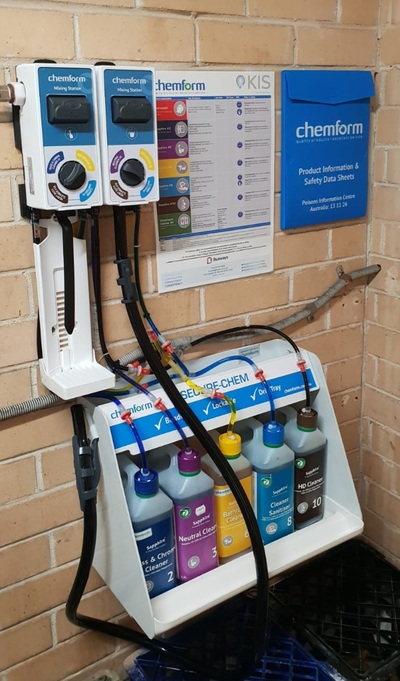This post was originally published on Sustainability Matters

In 2022, Australian bus operator Busways was searching for a sustainable set of detergents to replace the traditional cleaners used in its depots for bus washes, internal bus cleaning, depot cleaning and employee hand hygiene, including mechanics’ handwashing.
The company started a trial in October of that year, working with Klenall Industrial Suppliers (KIS) to test different products over an 8-week period. This involved engaging with Busways depot employees and adjusting the solution mix in response to feedback. A range of Good Environmental Choice Australia (GECA)-certified ecolabel nontoxic and biodegradable cleaning and degreasing solutions were tested in the trial, which proved a success.
Bus-wash automated control and dispenser.
The resulting cleaning solutions were rolled out to 19 Busways sites across NSW and SA by December 2022 in a concentrate form. Additionally, a custom-made automated dispenser for bus washes was developed, significantly reducing waste.
Since then, the cleaning solutions have kept Busways’ fleet of more than 1350 buses sparkling through over 46,000 bus wash cycles while leading to an 80% reduction in chemical drum packaging going to landfill, saving over 10,000 litres in chemicals manufactured and reducing transport emissions, with 14.6 fewer tonnes of freight shipped to Busways sites.1
Busways COO Chris Wolf said it was tricky to get the formulas just right. “There was a lot of testing and adjusting to achieve the right outcome that could deal with heavy-duty cleaning required in the bus industry,” he said.
“We already use grey water for our bus washes, but we felt it was important to invest in this next level to further enhance the safety of our people and the local environment around our depots as well as lowering our carbon footprint.”
GECA CEO Josh Begbie emphasised that certification from the independent not-for-profit organisation is a significant achievement. “GECA’s third-party assessment procedures are trusted and rigorous, looking at impacts across a product’s entire lifecycle, from extraction of raw materials to end of its life,” he said.
“Our licensees, Chemform and SC Johnson, had their products independently assessed against critical environmental, health, social and quality criteria. By procuring GECA-certified products, Busways has made a better choice for its employees, customers and our planet, and positioned itself as a leader and innovator within the industry.
“Our employees and communities can be confident that the cleaning products we now use have undergone a transparent, independent, third-party assessment against science-based criteria for a wide range of environmental, human health and social impacts across their entire lifecycle, while performing as promised,” Wolf added.
1. Figures are sourced from Klenall Industrial Suppliers reports on Busways site usage showing quantities of packaging, liquid products supplied and transport for product delivery.
Top image caption: Wheel cleaning.





0 Comments